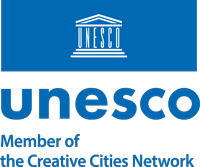UNESCO City of Literature

UNESCO Creative Cities Network, created in 2004, promotes international cooperation between cities that see creativity as accelerators of sustainable development. Creative fields include Crafts and Folk Art, Design, Film, Gastronomy, Literature, Media, Arts and Music.
In 2023, nipaluna/Hobart was designated a UNESCO City of Literature.
A city of storytelling: past, present and into the future
lutruwita/Tasmania has a strong arts and culture presence, especially around nipaluna/Hobart. Over time, an authentic Tasmanian voice has developed in our literature and storytelling. The Tasmanian Aboriginal community drew on their knowledge, history, resilience and creativity to retrieve and revive their language, palawa kani, a composite of lutruwita's original Aboriginal languages. This has seen this island's First Peoples interpreting their own stories in their own language.
Historically, literature flourished in colonial Hobart, which saw the publication of Australia's first work of general fiction in 1818, the opening of one of the nation's first public libraries in 1849, and the printing of Australia's first 'free press' paper in 1824.

Today, Hobart is home to a multitude of award-winning and best-selling authors who have been recognised both nationally and internationally, winning awards such as the Vogel Award, Stella Prize, Commonwealth Writers Prize, Prime Minister's Literary Awards, and the Booker Prize. From self-published authors to Richard Flanagan, winner of the Booker Prize, Hobartians have taken this special place to readers on every continent. Hobart is a reading city with well-loved libraries and bookshops, a small but adventurous local publishing industry, and a constantly evolving calendar of literary festivals, awards, events, and celebrations of reading.
Becoming a City of Literature grounds and connects these disparate parts to be an important cultural hub for Hobart as it emerges as a distinctive centre for engaging readers, promoting social inclusion and literacy, and supporting writers to explore inventive new ways of telling unique Tasmanian stories, now and for generations to come.

Hobart is a city of storytellers, and its UNESCO City of Literature status will allow nipaluna/Hobart to broadcast this internationally, facilitating cultural exchange and enhancing the city's reputation as a cultural destination.
Projects